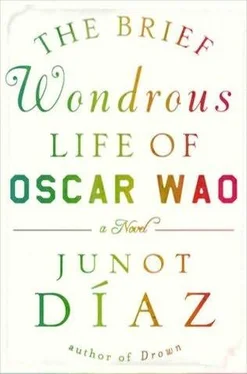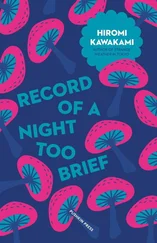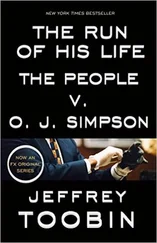Beli didn’t have six months. (Stability was not in our girl’s stars, only Change.) Without any warning a group of Socorro’s distant relatives showed up and claimed the child, tore her clean out of Zoila’s arms (the very same relatives Socorro had happily put behind her when she married Abelard). I suspect these people hadn’t actually intended to take care of the girl for any length of time, were only doing it because they expected some monetary reward from the Cabrals, and when no loot was forthcoming, the Fall was total, the brutos passed the girl on to some even more distant relatives on the outskirts of Azua. And here’s where the trail gets funky. These people in Azua seemed to be some real wack jobs, what my moms calls salvages. After only a month of caring for the unhappy infant, the moms of the family disappeared one afternoon with the baby, and when she returned to her village the baby didn’t. She told her vecinos that the baby had died. Some people believed her. Beli, after all, had been ailing for a while. The tiniest little negrita on the planet. fukú, part three. But most folks figured that she had sold the girl to some other family. Back then, as now, the buying and selling of children, common enough.
And that’s exactly what happened. Like a character in one of Oscar’s fantasy books, the orphan (who may or may not have been the object of a supernatural vendetta) was sold to complete strangers in another part of Azua. That’s right—she was sold. Became a criada, a restavek. Lived anonymously among the poorest sectors on the Island, never knowing who her real people were, and subsequently she was lost from sight for a long long time.↓
≡ I lived in Santo Domingo only until I was nine, and even I knew criadas. Two of them lived in the callejón behind our house, and these girls were the most demolished, overworked human beings I’d known at that time. One girl, Sobeida, did all the cooking, all the cleaning, fetched all the water, and took care of two infants for a family of eight—and chickie was only seven years old! She never went to school, and if my brother’s first girlfriend, Yohana, hadn’t taken the time—stolen behind her people’s back—to teach her her ABCs, she wouldn’t have known nada. Every year I came home from the States, it was the same thing; quiet hardworking Sobeida would stop in for a second to say a word to my abuela and my mother (and also to watch a couple of minutes of a novela) before running off to finish her next chore. (My mother always brought her a gift of cash; the one time she brought her a dress, her ‘people’ were wearing it the next day.) I tried to talk to her, of course Mr. Community Activist—but she would skitter away from me and my stupid questions. What can you two talk about? my moms demanded. La probrecita can’t even write her own name. And then when she was fifteen, one of the callejón idiots knocked her up, and now, my mother tells me, the family has got her kid working for them too, bringing in the water for his mother.
The next time she appears is in 1955. As a whisper in La Inca’s ear.
I think we should be very clear and very honest about La Inca’s disposition during the period we have been calling the Fall. Despite some claims that she was living in exile in Puerto Rico during the Fall, La Inca was in fact in Baní, isolated from her family, mourning the death of her husband three years earlier. (Point of clarification for the conspiracy-minded: his death occurred before the Fall, so he was definitely not a victim of it.) Those early years of her mourning had been bad; her hubby the only person she had ever loved, who had ever really loved her, and they’d been married only months before he passed. She was lost in the wilderness of her grief: so when word came down that her cousin Abelard was in Big Trouble with Trujillo, La Inca, to her undying shame, did nothing. She was in such pain. What could she have done? When news reached her of the death of Socorro and the dispersal of the daughters, she still, to her everlasting shame, did nothing. Let the rest of the family figure it out. It wasn’t until she heard that both Jackie and Astrid had passed that she finally pulled herself out of her malaise long enough to realize that dead husband or no dead husband, mourning or no mourning, she had failed utterly in her responsibility toward her cousin, who had always been kind to her, and who had supported her marriage when the rest of the family did not. This revelation both shamed and mortified La Inca. She got herself cleaned up and went looking for the Third and Final Daughter—but when she got to the family in Azua that had bought the girl, they showed her a little grave, and that was it. She had powerful suspicions about this evil family, about the girl, but since she wasn’t a psychic, or a CSI, there was nothing she could do. She had to accept that the girl had perished, and that it was, in part, her fault. One good thing about that shame and that guilt: it blew her out of her mourning. She came back to life. Opened up a string of bakeries. Dedicated herself to serving her customers. Every now and then would dream about the little negrita, the last of her dead cousin’s seed. Hi, tía, the girl would say, and La Inca would wake up with a knot in her chest.
And then it was 1955. The Year of the Benefactor. La Inca’s bakeries were kicking ass, she had reestablished herself as a presence in her town, when one fine day she heard an astonishing tale. It seems that a little campesina girl living in Outer Azua had tried to attend the new rural school the Trujillato had built out there but her parents, who weren’t her parents, didn’t want her to attend. The girl, though, was immensely stubborn, and the parents who weren’t her parents flipped when the girl kept skipping out on work to attend classes, and in the ensuing brawl the poor muchachita got burned, horribly; the father, who was not her father, splashed a pan of hot oil on her naked back. The burn nearly killing her. (In Santo Domingo good news might travel like thunder, but bad news travels like light.) And the wildest part of the story? Rumor had it that this burned girl was a relative of La Inca!
How could that be possible? La Inca demanded. Do you remember your cousin who was the doctor up in La Vega? The one who went to prison for saying the Bad Thing about Trujillo? Well, fulano, who knows fulano, who knows fulano, said that that little girl is his daughter!
For two days she didn’t want to believe. People were always starting rumors about everything in Santo Domingo. Didn’t want to believe that the girl could have survived, could be alive in Outer Azua, of all places!↓
≡ Those of you who know the Island (or are familiar with Kinito Mendez’s oeuvre) know exactly the landscape I’m talking about. These are not the campos that your folks rattle on about. These are not the guanábana campos of our dreams. Outer Azua is one of the poorest areas in the DR; it is a wasteland, our own homegrown sertão, resembled the irradiated terrains from those end-of-the-world scenarios that Oscar loved so much—outer Azua was the Outland, the Badlands, the Cursed Earth, the Forbidden Zone, the Great Wastes, the Desert of Glass, the Burning Lands, the Doben-al, it was Salusa Secundus, it was Ceti Alpha Six, it was Tatooine. Even the residents could have passed for survivors of some not-so-distant holocaust. The poor ones—and it was with these infelices that Beli had lived often wore rags, walked around barefoot, and lived in homes that looked like they’d been constructed from the detritus of the former world. If you would have dropped Astronaut Taylor amongst these folks he would have fallen to the ground and bellowed, You finally did it! (No, Charlton, it’s not the End of the World, it’s just Outer Azua.) The only non-thorn non-insect non-lizard life-forms that thrived at these latitudes were the Alcoa mining operations and the region’s famous goats (los que brincan las Himalayas y cagan en la bandera de España).
Читать дальше







![О Генри - Недолгий триумф Тильди [The Brief Debut of Tildy]](/books/415353/o-genri-nedolgij-triumf-tildi-the-brief-debut-of-thumb.webp)




